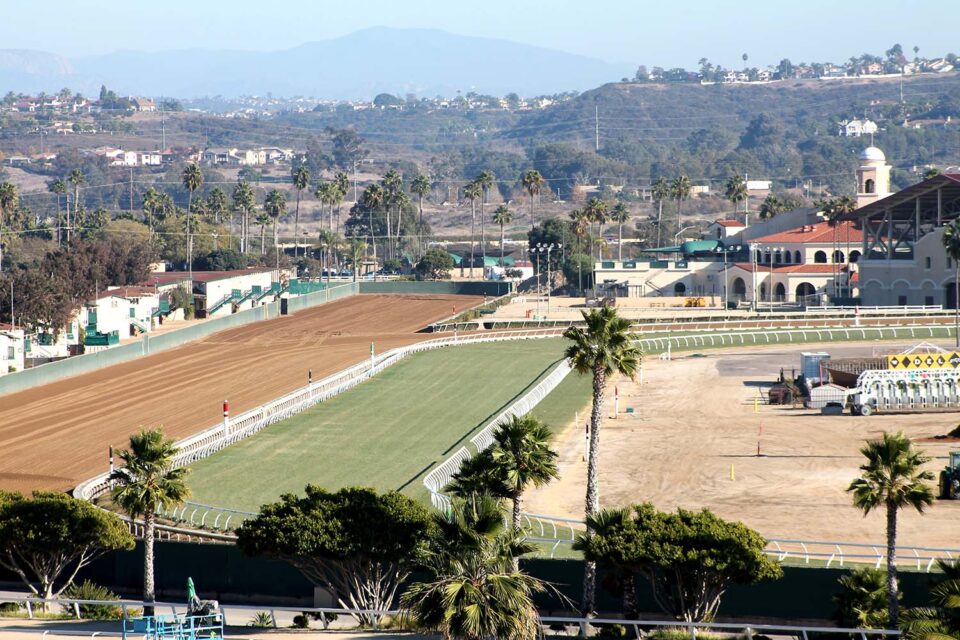Restrictions to slow the spread of COVID-19 “obliterated” the Fairgrounds’ business model, which “is almost exclusively reliant upon events and mass gatherings,” according to a Nov. 4 financial report.
Some activity has picked up. The horse racetrack’s fall meets opened Oct. 31, without live spectators. But overall wagering is up, thanks to internet wagering. That’s “very encouraging,” since fall horseracing must compete for an audience with football season, Josh Rubinstein told the 22nd District Agricultural Association board at its Nov. 10 meeting.
Rubinstein serves as president of the Del Mar Thoroughbred Club, which runs races under an operating agreement with the Fairgrounds.
The Fairgrounds put on its annual “Scream Zone” through October, this year as a drive-through event. Several other events are slated through November and December, including a drive-in concert series, Christmas tree sales, a gun show and horse shows.
Still, revenues for the calendar year through September tanked to $13 million — $65 million under budget — for a net $10 million operating loss.
“Efforts to-date to mitigate this financial crisis have included … reductions in temporary and seasonal employees, termination or renegotiation of service agreements, significant reductions in energy and utility needs, and cancellation of capital improvement projects not yet underway,” according to the financial report. “Permanent employees were reduced from 153 to 62” — “the bare minimum needed to maintain and secure the property.”
In April, the Fairgrounds estimated it needed “$25 million to survive until the end of the calendar year.” After cost savings, it now estimates it needs “less than $24 million through the end of the entire fiscal year, June 30.”
That figure represents an “unfunded target based on a sort of ‘worst-case scenario’ of ‘no events,’” Fairgrounds spokeswoman Jennifer Hellman said. “Alas, here we are, back in the purple tier,” the most restrictive of four state-defined COVID risk categories.
The Fairgrounds hopes to receive certain state monies under AB 75, a state budget augmentation approved in June, and a distribution the Food and Agriculture Department announced in September. Its fingers are also crossed for federal dollars from the Agricultural Fairs Rescue Act, HR 7883, introduced in July.
The Fairgrounds’ financial woes are to some extent structural in nature, long predating the pandemic, in part due to declining revenues from horse racing, as The Coast News recently reported. Those declining revenues in turn need to support tens of millions of dollars of capital improvement debt through 2038.
The organization has posted operating losses and a declining net position, or bottom line, pretty steadily since at least 2013, according to recent financial statements.
The San Diego County Fair consistently turns a profit, but not all events do likewise. For instance, the annual Del Mar Horse Show — a three-week affair each spring but canceled for 2021 — “has not seen positive returns” for “the last couple of years,” said Katie Mueller, Fairgrounds business services officer, on Nov. 10.
Hellman said staff is “working with our municipal financial advisor” but “wouldn’t want to speculate” whether he felt the Fairgrounds faces the risk of defaulting on its bonds.
The board aims to renew a strategic planning effort, on hold due to COVID, “in a way applicable to the environment that we live in today,” according to October minutes.
The City of Del Mar recently asked the Fairgrounds, a separately governed state agency, to identify some portion of its property for affordable housing development. Such a deal could help the city meet state-mandated housing targets, and also provide the Fairgrounds new revenue, Del Mar City Councilman Dwight Worden said in an August interview.
Deputy District Attorney Josh Caplan, who acts as the Fairgrounds’ counsel, is preparing a memo for the board, outlining whether and how a housing deal could happen. He estimates he’ll have it done early in the New Year. Though the board will likely discuss it only in “closed session,” that is, not in public.
Potentially piling onto other financial woes, “based on existing facts and circumstances,” the Fairgrounds faces “significant exposure to litigation,” the Nov. 4 financial report says.
One civil case alleges several people — including young children, one of whom died — contracted E. Coli from animal exhibits at the 2019 San Diego County Fair, due to Fairgrounds negligence, according to a complaint filed Oct. 9.
John Gomez, the plaintiffs’ attorney, believes a jury could award damages “well in excess of $10 million,” he told The Coast News.
Another lawsuit alleges the Del Mar Thoroughbred Club wrongfully banned a horse trainer from competing in Del Mar meets. The ban “irreparably” damaged the trainer’s reputation and business, to the tune of “tens of millions of dollars,” said Drew Couto, the trainer’s attorney.
The operating agreement between the Fairgrounds and Del Mar Thoroughbred Club requires the latter to indemnify the former “to the fullest extent permitted.” It also requires the Thoroughbred Club to maintain insurance coverage — at least $10 million for bodily injury and property damage liability combined, plus lesser amounts for other liabilities.
Hellman declined to comment on the Fairgrounds’ financial means to pay potential damages or settlements due to litigation.



